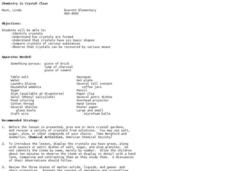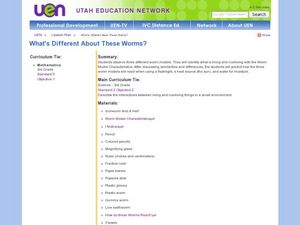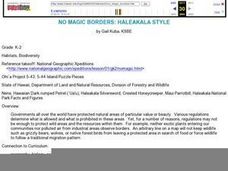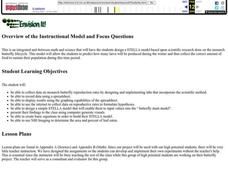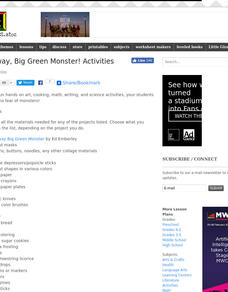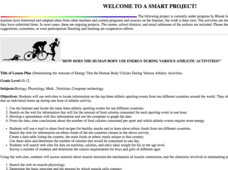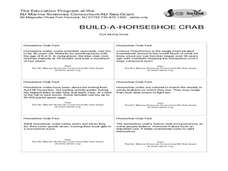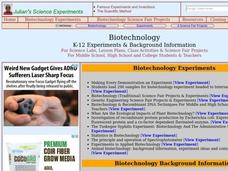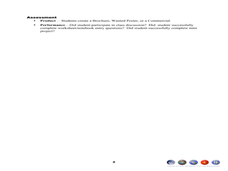Curated OER
Chemistry is Crystal Clear
Learners observe crystals and their shapes and formation. In this crystal formation activity, the teacher prepares crystal gardens for the students to observe, then the class finds examples of crystals in nature and observe a teacher...
Curated OER
Three Worm Lesson
Third graders observe properties of three worms. In this living and non-living lesson, 3rd graders study characteristics of living and non-living worms. Students experiment to find how light, heat and moisture effects each of the worms....
Curated OER
Dibble Pond Ecosystem
Students collect specimen and analyze it. In this biology activity, students analyze and evaluate the diversity found in specific environment. They use the correct terminology as they do their write up for the experiment.
Curated OER
'O'opu Life Cycle
Students investigate the life cycle of the 'o'opu also known as Hawaiian gobies. In this amphidromous living lesson, students discuss the reproductive cycle, create props and an obstacle course to demonstrate the importance of the...
Curated OER
The Dirt on Plants
Students draw and label the four parts of a plant. They describe changes that are part of the common life cycle. Students follow various one and two step directions. They are asked to discuss that they can recall about plants.
Curated OER
Skin and Sports
The topic is protecting our own protective covering: the skin. In particular, the information deals with sweating as a means of temperature regulation and the need to wear clothing appropriate for allowing the process to occur. Learners...
Curated OER
Caterpillars To Butterflies
Students gain an appreciation of nature by teaching them about the life cycle of the butterfly. They set up a terrarium so they can observe the changes a caterpillar goes through.
Curated OER
Biospheres in Your Backyard
Students collect data from a local river biome. They use the information for metric conversion and graphing equations. They study the components of what makes up a biosphere and how math is used to analyze one.
Curated OER
No Magic Borders: Haleakala Style
Students discuss borders and boundaries. They discuss pollution and the fact that boundaries cannot stop pollution and that pollution affects even protected wildlife and plants. They participate in an activity in which they must place...
Curated OER
Health: Basic Minerals
Students examine minerals as food nutrients and discover their importance as food sources in the diet. Among the learning options are completing worksheets, creating recipes, making billboards, and actually preparing some recipes rich...
Curated OER
Overview of the Instructional Model and Focus Questions
Young scholars design STELLA model based upon scientific research done on monarch butterfly lifecycle; model allows students to predict how many larva will be produced during the winter and thus collect the correct amount of food to...
Curated OER
Quick Breads, Pancake/Waffle Lab
Pupils explore the bread, cereal, grain food group on the Food Guide Pyramid. They test recipes for quick breads which are high in carbohydrates and determine the purpose of each of the ingredients in pancakes or waffles.
Curated OER
Buckets of Bucks for World Hunger
Students participate in a nonprofit organization activity for hunger outreach problems. In this service project lesson plan, students practice counting coins, complete a service project for a hunger outreach, discuss nutrition and...
Curated OER
Go Away, Big Green Monster! Activities
Students participate in art, math, writing, and science activities to realize they have nothing to fear from monsters. They make masks, shape monsters, toast monsters and monster cookies. They complete monster math problems and make...
Curated OER
From Corn To Tortillas
Students investigate the food known as the tortilla. They research the growth cycle of the corn plant and how tortillas are made from it. The importance of the tortilla according to the Hispanic culture is explained to the students. The...
US Apple Association
Apples: A Class Act! (Grades Pre-K–3)
Discover the nutritional wonders of apples and get to know Johnny Appleseed with a plethora of learning experiences that cover subjects math, history, English language arts, health, and arts and crafts. Activities include an apple...
Curated OER
"How Sweet It Is: Awareness Today Can Defeat Diabetes Tomorrow"
Young scholars explain the importance of having a healthy body and be inspired to make better choices. They research diabetes to become aware of its symptoms, dangers, and prevention. They identify the relationship between childhood...
Curated OER
Maintaining Plant Genebanks
Students examine the use, costs, and the need for plant gene banks. The rationale for gaining ownership over scientific information and the implications of the developing nations' reliance on biotechnology is explored in this...
University of Rhode Island
How Does the Human Body Use Energy during Various Athletic Activities?
Students investigate how much energy is used during different athletic activities. They conduct Internet research to obtain information on the top three athletic sporting events from around the world, and calculate the calories burned...
Curated OER
Build-A-Horseshoe Crab
Students discover many facts about horseshoe crabs. Students identify the main body parts of horseshoe crab. They explore the habits of the horseshoe crab and their importances to the ecosystem. Adaptations for younger students are...
Curated OER
Determination of the Physical Properties of Dietary Fibers
In this dietary fibers worksheet, students compare and contrast the properties of different fibers: cellulose, hemicellulose, pectin, guar, agar, and xanthan gum. This worksheet has 5 short answer questions.
Curated OER
Biotechnology
Students explore biotechnology through various activities. In this biology lesson, students analyze its pros and cons. They study and read informative articles about biotechnology.
Curated OER
Crops 2: What Plants Need to Grow
Students explore the kinds of things that plants need to grow well.
Curated OER
Blue Mud Shrimp Mystery
Students explore invasive species on an environment. In this exploratory lesson students hypothesize why shrimp are on the decline and make a brochure or poster showing their results.
Other popular searches
- Science Project Food Apples
- Science Project Food Chain
- Science Project Food Waste
- Science Project Food Rice
- Food Science Fair Projects
- Science Project Food Decay
- Science Projects Food Chain


